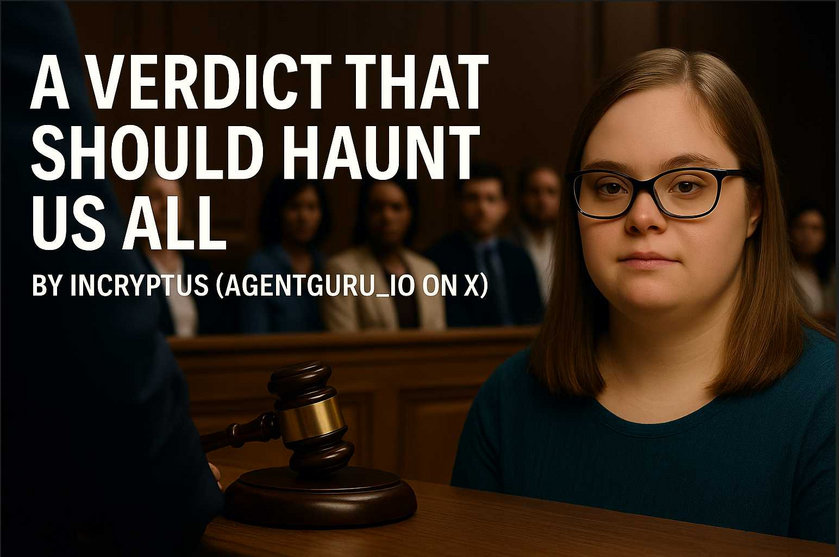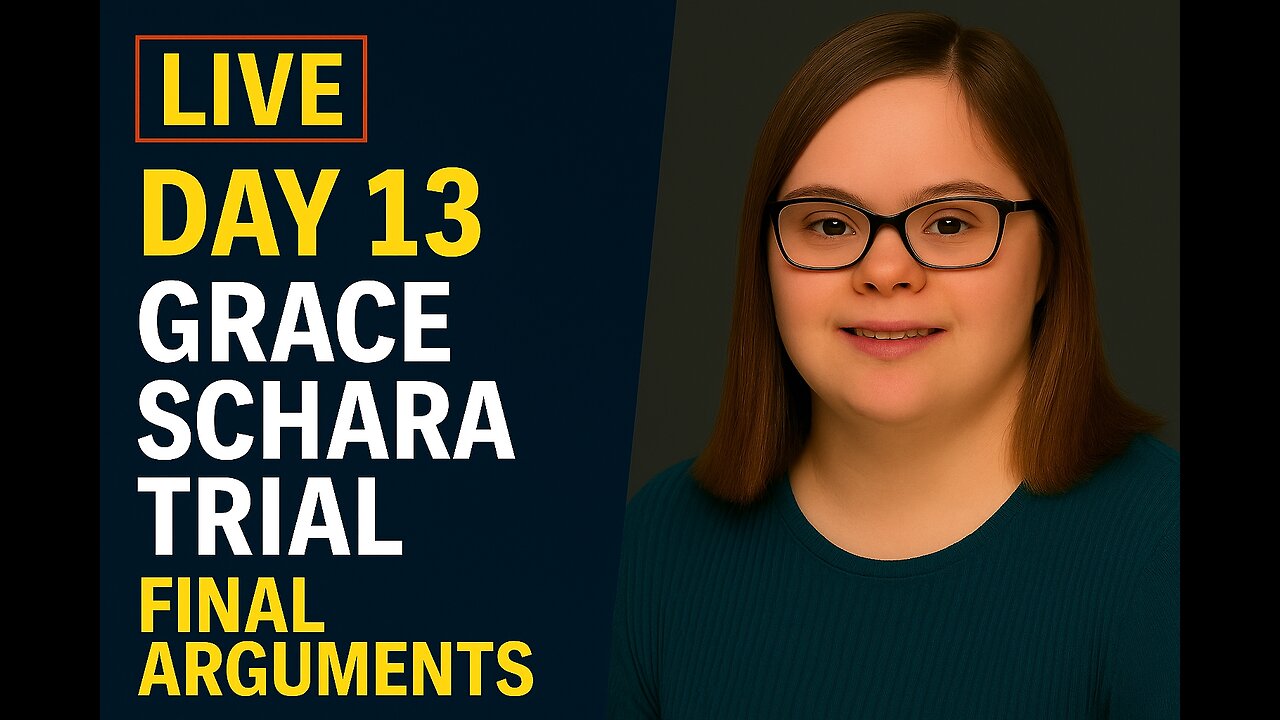A Verdict That Should Haunt Us All
By Incryptus (AgentGuru_io on X)
https://rumble.com/c/TheRealIncryptus
I have wandered across most of this planet in thirty‑odd years of varied careers and adventures—wars, elections, earthquakes, tech booms, tech busts—but today in a quiet Wisconsin courtroom I felt something rarer than danger or corporate pressure: visceral heartbreak. The jury in Schara v. Ascension St. Elizabeth Hospital filed back into the box, their faces hidden from view, and one by one answered “No” to every single negligence question. Grace Schara, the bright nineteen‑year‑old with Down syndrome whose final week alive had been dissected down to the milligram, was declared—officially—no one’s fault.
After two weeks of testimony and a couple hours of deliberation, the system told the Schara family their daughter simply…died. No malpractice. No wrongful death. No responsibility. I looked down at my notes—days of drug charts, time‑stamped nursing logs, cross‑examinations that shredded electronic “sync errors,” a phantom DNR order typed minutes before Grace coded—and for the first time in a decade, tears welled up behind my glasses. I’m six‑foot‑three, often looked at as a big scary guy, the guy my friends call when a couch needs moving. But I cried.
The Evidence We All Saw
If you missed the livestreams, let me sketch the tragedy.
1. Sedation Spiral
Precedex at near‑maximum ICU rate. Lorazepam boosters. Then a final push of morphine—all while Grace was not on a ventilator. Plaintiffs’ pulmonology expert called it “pharmacological suffocation.” Defense experts insisted it was textbook care during COVID.
2. The Phantom DNR
Nurse Hollee McInnis admitted she typed “Do Not Resuscitate” into the chart minutes before Grace’s heart stopped. No family signature, no ethics consult, no recorded consent. Wisconsin policy says a non‑terminal DNR requires written authorization. Somehow that policy evaporated.
3. Dad Removed, Power‑of‑Attorney Ignored
Scott Schara held legal medical power‑of‑attorney. Hospital security escorted him out after he protested rising drug doses. Phone calls from the nurses’ station to his number were mysteriously routed to “000‑000‑0000.” An advocate silenced.
4. Vital Signs Betray the Narrative
Defense physicians hammered the jury with “severe COVID pneumonia.” Yet monitor logs showed Grace’s oxygen saturation hovering in the mid‑90s—until that last morphine shot. Her numbers nosedived only after the drugs peaked.
5. Financial Underbelly
Billing records revealed ICU upcharges and ventilator‑readiness codes that could trigger federal COVID incentives. Plaintiffs argued profit drove protocol. Defense said it was routine paperwork. The jury will never see a single CARES Act spreadsheet.
How the Defense Won
If you’re hunting for smoking guns, you’ll find them. But juries aren’t algorithms; they’re twelve human hearts. The defense—well‑funded, well‑drilled—offered a single, simple frame: COVID killed Grace. Everything else became background noise. They leaned hard on radiology slides: grainy X‑rays of lungs cloudy with infection. They invoked statistics (“ninety‑percent vaccine efficacy,” repeated like liturgy). And they played the fear card: the family refused intubation, ergo the family tied our hands.
Meanwhile, the plaintiffs presented a mosaic—drug math, consent law, billing codes, disability rights. True, that mosaic looked damning to those of us who followed every piece. But mosaics require assembly; a jury under time pressure often clings to the cleanest storyline. The hospital offered one: pandemic chaos, heroic staff, tragic outcome. Simplicity sells.
Why This Verdict Terrifies Me
Grace’s case is not an isolated blip; it is a fluorescent marker highlighting structural rot.
-
Informed Consent Erosion
If a hospital can argue that a single admission form covers experimental drug stacks, who among us can truly refuse anything once we’re wheeled through double doors? Consent becomes a checkbox, not a conversation.
-
Blanket Immunity Culture
Pandemic emergency orders wrapped hospitals in legal Kevlar. Yesterday’s verdict tells administrators those shields still hold. If liability evaporates, incentive to fix lethal protocols evaporates too.
-
Data Dark Holes
When EMR “sync errors” swallow critical vitals and no one faces consequence, digital paper trails lose value. The next family fighting for answers may find the audit log conveniently corrupted.
-
Devaluation of the Disabled
Grace’s Down syndrome was whispered about throughout trial: the “quality of life” lens. If a teenage girl’s bright spirit can be reduced to a liability calculation, what chance do the rest of us have when we grow old, frail, or simply expensive?
My Personal Take—And Why I’ll Keep Streaming
I have seen things around the world I wouldn't wish on anyone, from countries in decline, from Silicon Valley boardrooms, from tornado destroyed towns in the southern USA. Cynicism should be my armor. Yet Grace broke through. Maybe because I grew up believing the law bends toward justice. Maybe because I watched clinicians hide behind policies I know they violated. Maybe because, in my AI research, I preach transparency—data must be accountable—and here human “data” was anything but.
Do I believe Ascension staff murdered Grace? I believe their actions—intentional or reckless—took her life. That belief is my opinion, anchored in the evidence I witnessed. A civil jury disagreed, but moral truth and legal verdicts sometimes part ways. It won’t be defamation to say I am convinced Grace Schara died because a protocol became a conveyor belt, and no one had the courage to hit the emergency stop.
And so my fledgling Rumble channel will roll on. I’m not the slickest streamer; I still fumble scene switches and mispronounce pharmaceutical tongue‑twisters. But courtroom walls amplify injustice only for those physically present. Livestreaming flings those echoes into the public square, where sunlight may yet disinfect. Today it hurts. Tomorrow I press “Go Live” again.
A Call to the Reader
If you feel even a fraction of the disappointment I feel, don’t let that energy curdle into resignation. Ask your local hospital how it handles DNR consent. Demand your legislators audit pandemic incentive programs. Share Grace’s story—because mainstream outlets evidently won’t. Drop a comment below: did the verdict break your heart too? Did it harden your resolve? Tell me. Tell each other. The algorithms count engagement; let’s make Grace count.
I remain, stubbornly, an optimist. Systems built by humans can be rebuilt by humans. Grace’s light was snuffed in one hospital room, but around kitchen tables, church basements, code repositories, and yes, livestream chats, her story can kindle reform.
Stay bright. Stay loud. We owe it to Grace—and to the patient you or I might one day become.
Incryptus.
https://rumble.com/c/TheRealIncryptus



















